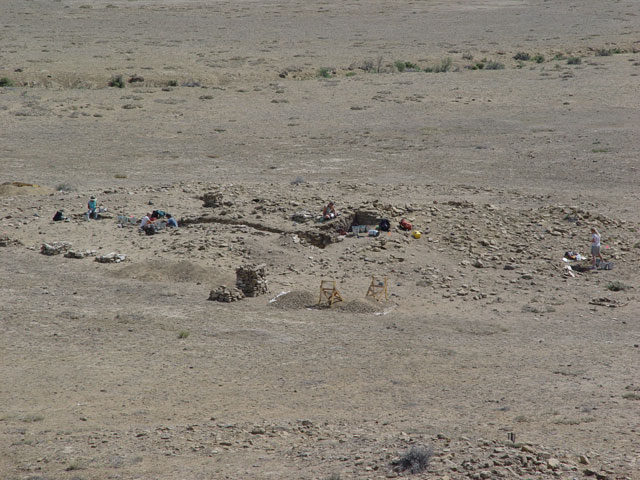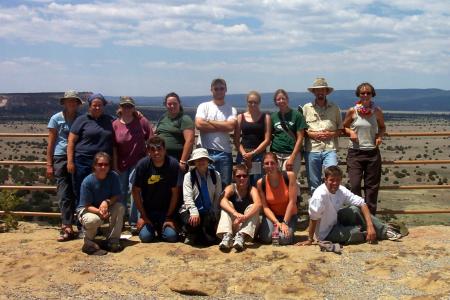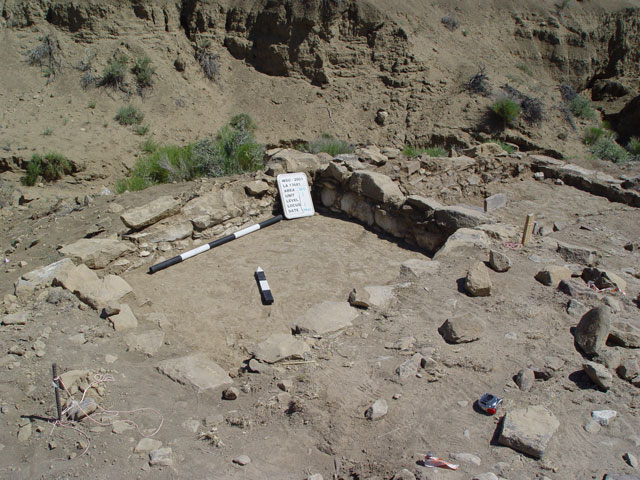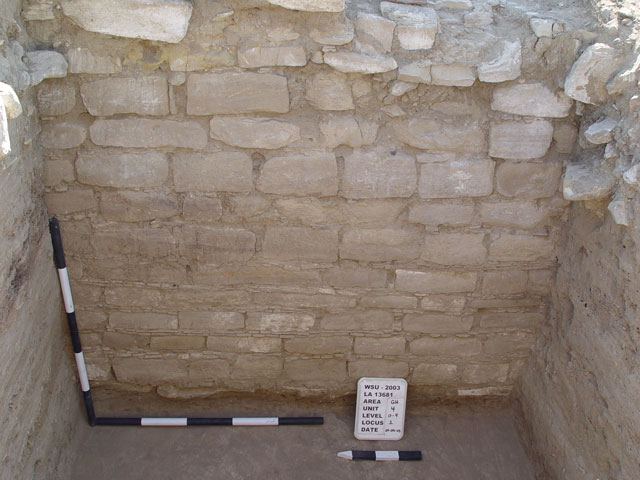
Washington State University
Archaeological Field School
Cox Ranch Community Research Project
West-Central New Mexico
May 29–July 3, 2005
The Cox Ranch Community Research Project is exploring the nature of community organization during the Chacoan era (A.D. 1000-1150), with work at one of the southernmost settlements linked to the Chacoan regional system. Washington State University researchers have been conducting archaeological field work in the community since 2002, and have directed field schools at the site since 2003. The field school program emphasizes linkages between field strategies and research interests, and is designed to provide a thorough introduction to archaeological field methods and Southwestern prehistory. The field school provides training in excavation, survey, and artifact identification and analysis. Excursions to archaeological and cultural sites in the region supplement the experience, providing a larger context for the project and Southwestern archaeological research.
The Cox Ranch Pueblo great house during excavation in 2004

The project is exploring the nature of community organization during the florescence of Chaco Canyon and the Chacoan regional system, a period in which there were widespread connections between settlements throughout much of the Four Corners area. Project research centers on Cox Ranch Pueblo, a complex consisting of a 50 room Chaco style great house surrounded by 18 smaller residences (Map of Cox Ranch Pueblo). Excavations are designed to recover artifacts that will permit us to determine if the residences were contemporaneous, to reconstruct the types of activities associated with each household, and to examine how they relate to the focal buildings at the site. Students will help us collect representative artifact samples from a variety of residential and great house contexts. In 2005, we plan to continue our testing of the great house and to begin testing residences throughout the site. Detailed mapping of residential structures will be conducted to better understand the growth of the site and its total population. Our three years of survey (2002-2004) of the lands surrounding Cox Ranch Pueblo have documented large portions of a dispersed community associated with the site, including a number of nearby field houses and residential settlements. Survey in 2005 will continue to expand coverage of the community, providing students the opportunity to learn survey methods and to see sites of different periods. Our research is conducted on lands administered by the Bureau of Land Management, and the project has the support and assistance of the New Mexico Bureau of Land Management, Socorro Field Office.
The 2003 field school crew at El Morro National Monument
Project Personnel. The field school is directed by Dr. Andrew Duff, assisted by at least four WSU graduate students. Dr. Duff’s research has emphasized the formation of communities and institutions of social integration between A.D. 1000-1400 in the northern Southwest, archaeological ceramics, and methods for exploring social identity in the past. The research interests and expertise of graduate assistants include faunal, ceramic, and lithic analyses, providing students and the project with additional expertise.
Logistics. The field camp will be based out of the small community of Fence Lake, New Mexico. At elevations between 6500-7000 feet, we expect hot days and cooler evenings. We will be tent camping on a ranch, using a mobile home as our kitchen and living room. Camp tasks and meal preparation are shared by all staff and students on a rotating basis. Field and camp materials will be provided, but students will need a tent, a sleeping bag, a dig kit, and a day pack. We will meet at the Albuquerque airport May 29 and return you to the airport July 3. The project site is about 2˝ hours southwest of Albuquerque.
Two rooms threatened by erosion excavated
in 2003 
Application and Enrollment: A complete application includes an application form, a recent transcript (unofficial is acceptable), and a letter of reference. Enrollment is limited. Review of completed applications has already begun, but we will continue to consider applications; please contact Dr. Duff if you have questions about applying. Undergraduate students enroll for 8 units (Anth 399, Washington resident $2064, non-resident $2144) and students that are currently enrolled in a graduate program enroll for 6 units (Anth 599, Washington resident $1734, non-resident $1794). There is a supplemental fee of $515.15 for food and transportation. Graduate credit is limited to those with a B.A. awarded prior to May 15, 2005 who are enrolled in a graduate program, and requires application to the WSU Graduate School (small fee + demonstration of undergraduate degree). Payment in full will be required by May 2. To download an application and a reference form, click on the links below. Contact Andrew Duff with questions: duff@wsu.edu, (509) 335-7828. Direct correspondence and applications to: Dr. Andrew Duff, Southwestern Field School, Department of Anthropology, Washington State University, Pullman, WA 99164-4910, Fax (509) 335-3999.
Stratified trash against the
back wall of the great house

APLICATION FORM
Application Form - Downloadable MS WORD File
RECOMMENDATION FORM